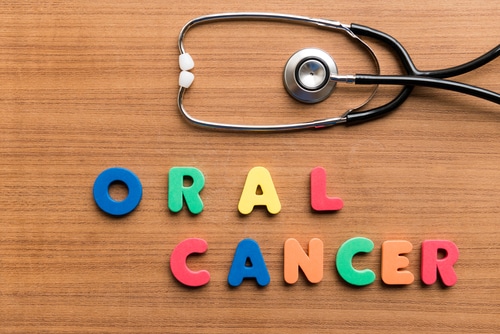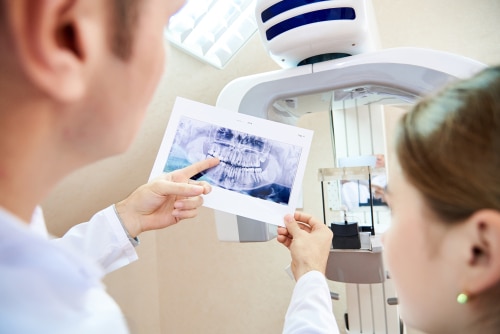Oral Cancer Screening in Dallas, TX
Oral cancers are cancers that develop in or around the mouth. They can affect many localized areas, such as the lips, cheeks, tongue, sinuses, or throat. Detecting oral cancer early through regular oral cancer screenings can significantly improve the chances of a successful outcome. At Bent Tree Dental, we are committed to providing our patients with comprehensive oral healthcare, including essential preventive services like oral cancer screening.
Causes of Oral Cancer
 Oral cancer can be triggered by many factors, so understanding these can help you adopt preventive measures and recognize warning signs.
Oral cancer can be triggered by many factors, so understanding these can help you adopt preventive measures and recognize warning signs.
Tobacco Use
Whether you smoke or use smokeless tobacco, you are increasing your chances of getting oral cancer. Tobacco use includes any of the following products:
- Cigarettes
- Pipes
- Cigars
- Snuff
- Chewing tobacco
According to the American Cancer Society, when you use tobacco, you expose yourself to more than 25 chemicals that are known to cause cancer.
Alcohol Consumption
Too much alcohol consumption can also increase your risk of developing oral cancer. If you drink alcohol and use tobacco excessively, you have an especially high risk of these diseases.
HPV
Certain variants of HPV can cause cancers in the back of the throat, tonsils, and base of the tongue.
Excessive Exposure to UV Rays
Excessive and prolonged exposure to the sun’s ultraviolet (UV) rays will increase your risk of lip cancer, a type of oral cancer.
Poor Nutrition
If your diet is deficient in fruits and vegetables, you increase your risk of oral cancer. Fruits and vegetables are rich in antioxidants and other nutrients that help prevent some of the internal damage that can lead to cancer.
Genetic Predisposition
Certain families pass genetic mutations down their bloodlines, which can increase the risk of oral cancer.
Symptoms of Mouth Cancer
It’s important to understand some of the potential symptoms of oral cancer so you can be aware. These symptoms may include:
- Persistent mouth sores that don’t heal
- Lumps or thickening in the cheek
- Chronic pain in the mouth that doesn’t go away
- White or red patches on the lining of the mouth, tongue, gums, or tonsils
- Frequent sore throat
- A constant feeling that something’s caught in your throat
- Difficulty chewing and swallowing
- Stiff feeling in the jaw or tongue
- Numbness in the tongue or around other areas of the mouth
- Voice changes
If you notice any of these symptoms, you should contact Rick Miller, DDS, at Bent Tree Dental immediately.
How to Perform a Self-Exam for Oral Cancer
You should perform a self-exam for oral cancer at home at least once a month.
Start by using a bright light and a mirror to look at and feel your lips and the front of your gums. Then, tilt your head back to look at and feel the roof of your mouth.
Next, you can pull your cheeks out to see the inside of their surfaces and look at the back of the gums. Look over all the surfaces of the tongue.
Make sure to also look at the floor of your mouth and the back of your throat.
Finally, feel for both lumps and enlarged lymph nodes on either side of your neck and under your jaw.
Self-exams for oral cancer are a great idea, but they do not replace regular professional checkups by Dr. Miller.
Oral Cancer Screening Process
 At Bent Tree Dental, the oral cancer screening process is simple, quick, and convenient. We incorporate these screenings regularly into patient appointments because the earlier oral cancer is detected, the higher the chances of successful treatment.
At Bent Tree Dental, the oral cancer screening process is simple, quick, and convenient. We incorporate these screenings regularly into patient appointments because the earlier oral cancer is detected, the higher the chances of successful treatment.
Preparation
If you’re wearing any dentures or partials, we’ll ask you to remove them before beginning the exam.
Visual Examination
Dr. Miller begins with a visual inspection of your mouth, lips, neck, and face. He looks for any abnormalities like:
- Asymmetries
- Swelling
- Patches of color
- Bumps
- Ulcerations
If he detects any visible abnormalities, he will recommend the next steps you can take.
Physical Examination
Dr. Miller then proceeds with the physical examination, which includes feeling around these areas:
- Head
- Cheeks
- Under the chin
- Around the jaw
- Inside the oral cavity
This step is to check for any nodules or unusual masses. It also includes checking for any asymmetry on your face or neck to see if there’s swelling on one side.
Intraoral Examination
During the intraoral examination, Dr. Miller uses a light and a mirror to get a better view of the inside of your mouth and throat. This allows him to look for any noticeable changes in color or texture on your tongue, your cheeks, the back of your throat, and the roof and floor of your mouth.
Intraoral Photographs
In some cases, we use intraoral photographs, which are high-resolution images that help us identify changes that aren’t visible to the naked eye alone.
Intraoral photographs also serve as visual records that allow us to monitor any changes over time.
Dental X-Rays
Dental X-rays aren’t a standard part of every oral cancer screening, but if Dr. Miller has any concerns, he may use X-rays to look for issues that aren’t visible during the visual examination.
Biopsies
Biopsies aren’t a standard part of every oral cancer screening, either. But if you are at high risk of oral cancer, Dr. Miller might collect a tissue sample (known as a biopsy) to send to a lab for analysis. The analysis helps determine the true nature and severity of any abnormal cells in the mouth and throat.
Biopsies are a definitive way to determine whether a suspicious area is truly cancerous. If you do receive a diagnosis of oral cancer, Dr. Miller will discuss the findings with you and suggest appropriate next steps you should take, which may include a referral to a specialist for treatment.
Oral Cancer Screening in Dallas, TX
Oral cancer screenings are a great step to incorporate into your oral hygiene routine to ensure your mouth and surrounding areas are healthy. Everyone should get regular oral cancer screenings, especially if oral cancer is common in your family.
To learn more about oral cancer screening at Bent Tree Dental, give us a call.
